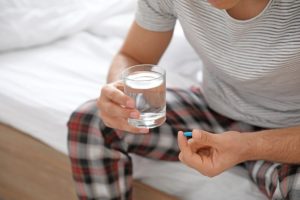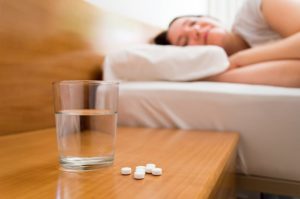When you buy through our links, we may earn a commission. Products or services may be offered by an affiliated entity. Learn more.
Over the Counter Sleep Aids
- OTC sleep aids include melatonin, antihistamines, and valerian root.
- Short-term use is recommended to avoid dependence.
- Consult with your doctor about potential side effects or interactions.
Many people take sleeping pills in order to fall asleep more quickly and get enough rest, and most of the common medications used require a prescription from your doctor. Other types of sleep aids are available over-the-counter (OTC) without a prescription and can be used to treat insomnia and other sleep issues, but you should still exercise caution and speak to a doctor about risk factors, side effects, and other potential concerns before taking these medications for the first time.
Which OTC Sleep Aids Are Available?
While you can choose from dozens of different brand names, most OTC sleep aids fall into one of the following categories based on their chemical composition. Always consult a physician , whether or not it requires a prescription.
Melatonin
Melatonin is a natural hormone produced in the brain. During the day, your eyes perceive the presence of natural light and signal the brain to secrete hormones (like cortisol) that promote feelings of wakefulness and alertness. As daylight fades in the evening, your brain receives signals to release melatonin, which makes you feel sleepy.
Certain factors can hinder or decrease melatonin production, such as exposure to light in the evening that can confuse the brain into thinking you should feel awake. To boost low melatonin levels, some people take melatonin supplements. These supplements are most commonly made from synthetic components.
Melatonin may be recommended or prescribed for certain conditions, such as delayed sleep-wake phase disorder or shift work disorder, as well as certain sleep disorders in children. Melatonin may also improve symptoms for travelers experiencing jet lag.
The U.S. Food and Drug Administration (FDA) classifies melatonin as a dietary supplement and does not regulate it as strictly as other types of medication. Doctors advise that melatonin carries an allergy risk for some individuals. People with epilepsy and those who take blood-thinning medication should also be under medical supervision while taking melatonin in order to avoid potentially dangerous interactions.
Diphenhydramine
Diphenhydramine is an FDA-approved antihistamine commonly marketed under the brand name Benadryl. It is found in a wide variety of brand-name OTC pain-relieving or fever-reducing medications , including Advil PM, Excedrin PM, Nytol, Tylenol PM, and ZzzQuil.
Diphenhydramine is a first generation antihistamine and is traditionally used to treat allergies, allergic reactions, and itching. Because of its sedative effects, it’s used in OTC sleep preparations.
The efficacy of diphenhydramine as a sleep aid is debatable. While it can help people fall asleep, its overall benefits are in doubt and people have less restorative sleep and can feel groggy the next day. Diphenhydramine taken at night has been associated with psychomotor impairments and daytime sleepiness.
Some studies have found that a relatively large number of older adults may chronically take medications with diphenhydramine for insomnia treatment or self-care. Older people account for roughly 35% of OTC medication use in the U.S., and 12% of adults 65 and older take OTC sleeping pills.
Chronically taking these medications can be problematic for elderly adults because our metabolism slows down as we age, which extends the half-life of medications and prolongs their effects. This can lead to a “residual sedative effect” if these sleep aids are taken in the evening.
Teenagers and young adults should also exercise caution with diphenhydramine. The FDA warns that higher-than-recommended doses of diphenhydramine can lead to serious medical problems , including seizures, heart attack, coma, and death.
Doxylamine
Like diphenhydramine, doxylamine – also known as doxylamine succinate – is a first-generation antihistamine that can produce sedative effects. Doxylamine can serve as a short-term treatment for insomnia , or be used with decongestants to alleviate cold symptoms such as sneezing or nasal congestion. It is marketed under brand names such as Nyquil, Unisom SleepTabs, Medi-Sleep, and Good Sense Sleep Aid, and may also be an active ingredient in pain-relieving and fever-reducing medications.
Doxylamine is only intended to be taken for short periods of time. Contact your doctor for additional medication options if your symptoms persist past seven days.
As with diphenhydramine, studies have shown that senior citizens often take these medications chronically. Older adults need to especially exercise caution when taking these medications.

Valerian
Valerian is an herb marketed and sold as a dietary supplement under the name “valerian root,” and is often found in OTC sleep aids used to treat insomnia and anxiety. While the functionality of valerian is not fully understood, researchers believe it interacts with GABA, serotonin, and adenosine receptors. Thus far, evidence that valerian is an effective treatment for insomnia has been inconclusive.
Since valerian is a dietary supplement, it is not subjected to the same level of FDA evaluation and approval as prescription sleep medication. As a result, the composition of valerian root pills may vary by brand. High doses of valerian at night have been attributed to morning sleepiness, but a standard 600mg dose does not appear to cause issues with reaction time, alertness, or concentration.
The effects of valerian on unborn fetuses and infants need to be studied further, so pregnant women or nursing mothers should not take valerian unless they are under medical supervision. The same goes for children under 3 years. Additionally, valerian may interact with other sleep medications and produce added grogginess the next day.
Do OTC Sleep Aids Cause Side Effects?
While the side effects of OTC sleep aids depend on certain factors such as dose and the person taking them, these medications are associated with the following:
| OTC Sleep Medication | Potential Side Effects |
|---|---|
| Melatonin | Depression, dizziness, bedwetting, excessive daytime sleepiness, headache, and nausea |
| Diphenhydramine | Daytime grogginess, dizziness, trouble urinating and confusion (in the elderly) |
| Doxylamine | Daytime grogginess, dizziness, trouble urinating and confusion (in the elderly) |
| Valerian | Headache, stomach upset, dry mouth, anxiety/mood changes, daytime drowsiness |
As with other medications, you should exercise caution and speak with your doctor before taking any sort of OTC sleep aid. The physician will help you understand the potential side effects and drug interactions, as well as alternative treatment options that may serve you better.
Medical Disclaimer: The content on this page should not be taken as medical advice or used as a recommendation for any specific treatment or medication. Always consult your doctor before taking a new medication or changing your current treatment.
References
5 Sources
-
Albert, S. M., Roth, T., Toscani, M., Vitiello, M. V., & Zee, P. (2017). Sleep Health and Appropriate Use of OTC Sleep Aids in Older Adults-Recommendations of a Gerontological Society of America Workgroup. The Gerontologist, 57(2), 163–170., Retrieved from
https://pubmed.ncbi.nlm.nih.gov/26511271/ -
Abraham, O., Schleiden, L., & Albert, S. M. (2017). Over-the-counter medications containing diphenhydramine and doxylamine used by older adults to improve sleep. International journal of clinical pharmacy, 39(4), 808–817., Retrieved from
https://pubmed.ncbi.nlm.nih.gov/28466395/ -
U.S. Food and Drug Administration. (2020, September). FDA warns about serious problems with high doses of the allergy medicine diphenhydramine (Benadryl)., Retrieved November 30, 2020, from
https://www.fda.gov/drugs/drug-safety-and-availability/fda-warns-about-serious-problems-high-doses-allergy-medicine-diphenhydramine-benadryl -
AHFS Patient Medication Information; American Society of Health-System Pharmacists. (2018, July 15). Doxylamine., Retrieved November 30, 2020, from
https://medlineplus.gov/druginfo/meds/a682537.html -
National Institutes of Health Office of Dietary Supplements. (2013, March 15). Valerian., Retrieved November 30, 2020, from
https://ods.od.nih.gov/factsheets/Valerian-HealthProfessional/























